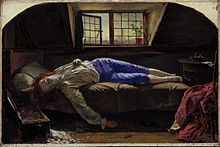Thomas Chatterton
Thomas Chatterton (born November 20, 1752 in Bristol , † August 25, 1770 in London ) was an English poet .
Life
Chatterton was the son of a sexton born Thomas Chatterton (1713-1752) and visited the charity school of Colston . At the age of eleven he was already writing a satire on a Methodist who had left his church for his own benefit.
At fourteen he took up a job as a clerk with a lawyer in Bristol and soon afterwards brought to light poems which, he claims, had been written by a 15th century monk named Rowley and which were now causing quite a stir. Among them were a celebratory poem on the inauguration of a bridge, the fragments of a tragedy, Ella and ballad-like compositions about the events of the Norman conquest.
In April 1770 he was dismissed by his employer. Chatterton went to London. A short time later, Chatterton put an end to his life with poison.
There is no doubt that Rowley's alleged poetry stemmed from Chatterton himself: it is not only to be admired the talent with which he reproduced the language and expression, even the outward design of the poems of an earlier time, so that even connoisseurs were deceived, but even more the ingenuity, the wealth of ideas and the poetic variety of variations that reveal themselves in them. Strangely enough, however, the poems Chatterton wrote in modern English are mostly mediocre. The complete editions of his works were published in London in 1842 (2 volumes) and 1871 (2 volumes). John Dix wrote a biography in 1837.
reception
On February 12, 1835, the drama "Chatterton" by Alfred de Vigny (1797–1863) premiered in Paris , in which the (fictional) unhappy love of Chatterton for the wife of an English manufacturer is the reason for his suicide. The controversial early Canadian prehistoric and ethnologist Daniel Wilson , professor of University College and later president of the University of Toronto , wrote Chatterton. A Biographical Study , a study published in London in 1869.
Based on de Vigny's literary model, which is reminiscent of Goethe's “The Sorrows of Young Werther”, Ruggero Leoncavallo (1857–1919) wrote the libretto for his three-act opera “Chatterton”, which was presented on March 10, 1896 in the Teatro Nazionale in Rome under the musical Directed by Vittorio Podesti with the tenor Benedetto Luchignani in the role of Thomas Chatterton. There are two complete recordings of Leoncavallo's opera, a historical one from 1908 under the direction of the composer with the tenor Francesco Signorini as Chatterton (published by various labels) and a studio recording from 2004 under the direction of Silvano Frontalini with the tenor Renato Zuin in the title role (Label: Bongiovanni).
The English painter Henry Wallis painted "The Death of Chatterton" in 1856, which was exhibited at the Royal Academy . This picture also adorns the background of the album cover "Shotter's Nation" by the band Babyshambles . Ernst Penzoldt processed Chatterton's life in the novella “Der arme Chatterton” (1928), Hans Henny Jahnn in the tragedy Thomas Chatterton (1955). In his novel "Chatterton" (1987), the English writer Peter Ackroyd, on the other hand, unravels a story on three levels of time, the life of Chattertons, the creation of the painting of his death by Henry Wallis and the search for the creation of several writers and intellectuals in the 1980s of another painting, which supposedly also depicts Chatterton.
literature
Work editions
- The Poetical Works of Thomas Chatterton . 2 volumes, with an introduction and annotations by Walter W. Skeat and a biographical sketch by Edward Bell . Bell & Daldy, London 1871.
- The Complete Works of Thomas Chatterton: A Bicentenary Edition . Edited by Donald S. Taylor and Benjamin B. Hoover. 2 volumes. Clarendon Press of Oxford University Press, Oxford 1971, ISBN 0-19-811848-1 .
- Thomas Chatterton: Selected Poems . Edited by Nick Groom. Cyder, Cheltenham 2003, ISBN 1-86174-133-2 .
Secondary literature
- Louise J. Kaplan: The Family Romance of the Impostor-poet Thomas Chatterton . University of California Press, Berkeley and Los Angeles 1987, ISBN 0-520-06565-4 .
- Edward Harry William Meyerstein: A Life of Thomas Chatterton . Ingpen and Grant, London 1930.
- Daniel Cook: Thomas Chatterton and Neglected Genius, 1760-1830 . Palgrave Macmillan, Basingstroke 2013, ISBN 978-1-137-33248-6 .
- Natascha Hoefer: Chatterton or the myth of the ruined poet: work and effect of the English poet . Böhlau, Cologne / Vienna 2010, ISBN 978-3-412-21315-2 .
- Heiko Postma : "I pay mockery home with mockery and pride with pride" - About the forger and poet Thomas Chatterton (1752–1770) . jmb, Hannover 2008, ISBN 978-3-940970-09-1 .
- Jürgen Heizmann: Chatterton or The Fake of the World . Mattes, Heidelberg 2009, ISBN 978-3-86809-011-6 .
- Rainer Guldin: Mirror stories: To Hubert Fichtes and Hans Henny Jahnns Thomas Chatterton. Rimbaud-Verlagsges., Aachen 2010, ISBN 978-3-89086-961-2 .
Fiction
- Ernst Penzoldt : Poor Chatterton. Story of a child prodigy. Novel. Insel, Leipzig 1928.
- Hans Henny Jahnn : Chatterton. In: Hans Henny Jahnn: Works in individual volumes. Dramas II. Ed. Uwe Schweikert . Hamburg 1993, pp. 603-705.
- Peter Ackroyd: Chatterton. Translated from the English by Bernd Rullkötter. Reinbek 1990.
- Peter Ackroyd: Chatterton - The Allington Solution. Radio play. BBC, Radio 4, 2008.
Web links
- Literature by and about Thomas Chatterton in the catalog of the German National Library
Individual evidence
- ↑ Chatterton, Thomas (1752–1770), poet. Retrieved July 22, 2020 (English).
- ^ John Dix: The life of Thomas Chatterton, including his unpublished poems and correspondence . London 1837 ( archive.org )
| personal data | |
|---|---|
| SURNAME | Chatterton, Thomas |
| BRIEF DESCRIPTION | English poet |
| DATE OF BIRTH | November 20, 1752 |
| PLACE OF BIRTH | Bristol |
| DATE OF DEATH | August 25, 1770 |
| Place of death | London |

